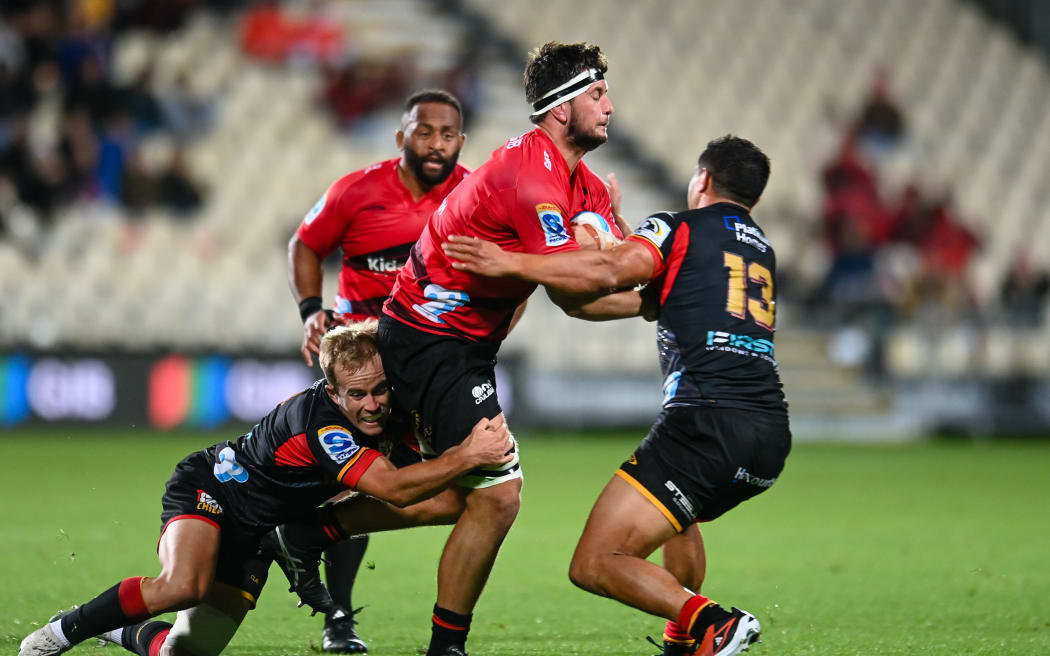Not since the upheavals of the 80s has New Zealand rugby faced such turmoil.

Quinten Strange of the Crusaders is tackled by Xavier Roe of the Chiefs and Anton Lienert-Brown of the Chiefs during the Super Rugby Pacific match, Crusaders Vs Chiefs, at the Apollo Projects Stadium, Christchurch, New Zealand, 29th March 2024. Copyright photo: John Davidson / www.photosport.nz Photo: © Photosport Ltd 2024 www.photosport.nz
The game of rugby is facing the same sort of crisis that nearly consumed it in the 1980s, according to Sky sport commentator Tony Johnson.
There may be no Springbok protests, the new broom of professionalism has done its thing, and women are out of the tuck shop... but the list of issues the sport faces is vast.
They include New Zealand Rugby chair Dame Patsy Reddy threatening to resign if board reform doesn't go her way, competition with other sport, and dwindling crowds, though Johnson says our collective memory might be skewed and "it's still a very popular game".
"Anecdotally people will say 'I'm not interested in rugby anymore'... or 'look at the crowd for that game, half empty' etc etc. We tend to be a little bit selective in our memories. People will point back to the mid-80s and go 'oh they used to have 30,000, 40,000 ... well yes they did. They had 30,000 or 40,000 if Canterbury were playing Auckland for the Ranfurly Shield because that was the biggest thing in the game back then. But I went to plenty of games in the 70s and 80s where you count the crowd in hundreds, rather than thousands.
"It wasn't always this Utopia of packed-out crowds for every single game.
"Yes, at the moment it's not as good as it's been. Super rugby in its hey-day yes, got massive crowds all the time and that has fallen away.
"But this year the attendances have been solid rather than spectacular, and the viewing figures are still very good. The interest is still there. I think there is a perception though that interest is waning and that's something that certainly needs to be addressed because that negativity does tend to gnaw away at the popularity of a sport."
The Detail also speaks to long time rugby writer Phil Gifford.
"It's a sport that is under siege, it's as simple as that," he says.
"Crowds are down, television audiences are down, the NPC, the provincial competition draws tiny crowds... club rugby is struggling to stay alive especially in small towns. The game itself, I think, needs to have a good hard look and say to itself 'how can we make this game more attractive a) to watch and b) to play'."
Both experts list the same issues that are tripping rugby up.
They include governance - where a review has said big changes need to be made, but provincial unions are pressing back against them - complicated rules, lack of money filtering down to the provinces, mystery over what's happened to the money from the controversial Silver Lake deal, head injuries, the elitism ruining schoolboy rugby, other sports eating into rugby's dominance, and the future of the women's game.
Just 17 months ago New Zealand came alight as our Black Ferns stole the women's Rugby World Cup from England, but since then there have been funding and crowd size issues with the women's game that need attention.
Phil Gifford also points out that world rugby is in for a huge dose of bad publicity this year as a group of players, including former All Black Carl Hayman, take legal action claiming the sport is ignoring growing scientific evidence that head knocks cause brain injuries.
"It's a huge issue," he says.
"It is a physical contact sport, you can't get away from that... you have to make damn sure that if a person's concussed you stop them from [playing].
"To be fair to rugby, it's getting much better at that but it has to get even better, and I think it has to do everything it can to publicise the fact that it is aware of the possible physical dangers."
Check out how to listen to and follow The Detail here.
You can also stay up-to-date by liking us on Facebook or following us on Twitter.


